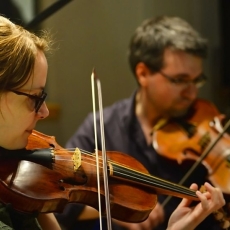
Concerto Caledonia - Oswald: Colin's Kisses - The Consort
James Oswald (1710-69) was born in Crail, a fishing village on the east coast of Scotland, in the county that still calls itself proudly the Kingdom of Fife. After spells in Dunfermline and Edinburgh he moved in 1741 to England, settling first in London and finally at Knebworth in Hertfordshire. At various times he was a dancing master, teacher and composer. In London he initially worked for a publisher before opening his own shop close to St Martin-in-the-Fields, the church designed by his fellow Scot, the Aberdonian James Gibbs, He was sufficiently successful as a composer to become Chamber Composer to George III and master of Knebworth House. He also became a freemason, and was a member of a group of musicians known as The Society of the Temple of Apollo. Oswald's musical publications consisted first of collections of traditional Scottish tunes, then of his own pieces influenced by the melodies of his native land. Of The music on this disc, the latter category predominates. The programme is constructed around the first ten of Colin's Kisses twelve settings, published in 1742, of poems by his friend Robert Dodsley. Prominently interspersed are excerpts from Oswald's Airs for the Seasons: two sets, each containing a dozen airs for every season (a total of 96 works), all with floral titles. The other items consist of 'Balance a Straw', a setting of verses by another Scot, the novelist Tobias Smollett; A sonata of Scots tunes, published in 1740 with a different traditional tune as the basis of each of the five movements; 'The Dancing Master', a satirical song published in The Gentleman's Magazine of 1754; the fourth of Twelve Divertimentis (1758) of which the only known copy survives in Cardiff University Library, the set having been composed for the wire-strung guittar ('English guitar'); The Dust Cart, a cantata satirizing Italianate recitative and aria; and the fourth of The Twelve Serenatas (1762). It requires far too much effort to imagine better performances. David McGuinness manages the trick of extracting from his ensemble the utmost Scottishness within each piece without descending into Caledonian nostalgia. The two singers display the right degree of affectation where appropriate, tempered by a judicious lightness of touch. The music itself is utterly charming but not of the sort that promises to provide any stunning surprises. I must confess that I was most delightfully jolted by Paula Chateauneuf's rendition of the fourth divertimento on the English guitar. It is a long time since I encountered such a delectable new sound from early music.